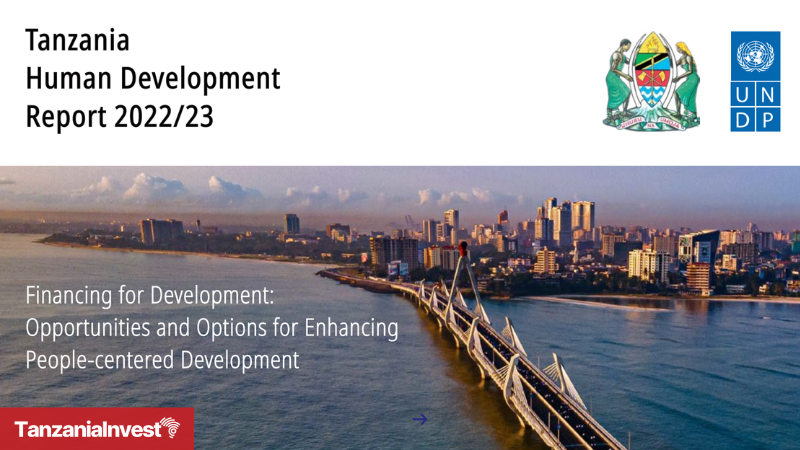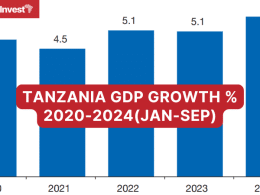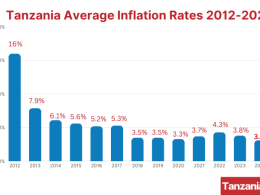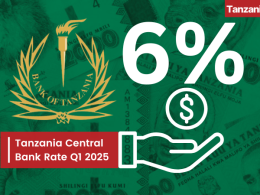The United Nations Development Programme (UNDP) and the Government of Tanzania have released the Tanzania Human Development Report 2022/23, titled “Financing for Development: Opportunities and Options for Enhancing People-centered Development.”
This landmark report offers a comprehensive analysis of Tanzania’s progress in human development and outlines innovative financing strategies to accelerate growth and improve the lives of its citizens.
Tanzania’s Human Development Improvements
Since gaining independence in 1961, Tanzania has consistently prioritized human development as a cornerstone of its economic policies. The country has made significant strides, with the Human Development Index (HDI) showing steady improvement over the years. Life expectancy has increased from 50.2 years in 1990 to 65.5 years in 2021, reflecting substantial progress in healthcare and living conditions.
The report highlights notable achievements in reducing income poverty, with basic needs poverty decreasing from 28.2% in 2011/12 to 26.4% in 2017/18. Additionally, Tanzania has made remarkable progress in expanding access to education, healthcare, and basic infrastructure such as clean water and modern housing materials.
However, challenges remain. The report emphasizes the need for continued efforts to translate Tanzania’s impressive macroeconomic performance into more inclusive human development outcomes, particularly in rural areas and for disadvantaged populations.
Innovative Financing Mechanisms
To address these challenges and accelerate progress, the report explores several innovative financing mechanisms:
- Bond Markets: The report recommends developing municipal bonds, diaspora bonds, and Eurobonds to attract diverse investors. These instruments can help finance local infrastructure projects, tap into the resources of Tanzanians living abroad, and access international capital markets.
- Green and Blue Bonds: Introducing sustainable finance options such as green bonds and blue bonds can help address environmental challenges while attracting socially conscious investors. These bonds can finance projects related to renewable energy, sustainable agriculture, and marine conservation.
- Social and Development Impact Bonds: These innovative financial instruments tie investor returns to the achievement of specific social or development outcomes, aligning private sector incentives with public policy goals.
- Private Equity: Encouraging private equity investments is seen as a crucial strategy to support business growth and job creation. The report notes that private equity and venture capital sources in East Africa are diverse, including development finance institutions, fund of funds, and family offices.
- Impact Investing: The report promotes investments that generate positive social and environmental impacts alongside financial returns. This approach can help channel private capital towards projects that contribute to sustainable development goals.
- Crowdfunding: Leveraging technology to mobilize small-scale investments from a large number of individuals is identified as a potential source of funding for small and medium-sized enterprises and social projects.
Policy Recommendations
To make financing for development work effectively for human development, the report recommends several key policy interventions:
- Strengthening Public Finance Measures: The government is advised to enhance revenue collection and improve expenditure efficiency. This includes modernizing tax administration, broadening the tax base, and implementing more effective public financial management systems.
- Enhancing Private Sector Financing Capacity: Improving access to credit and financial services for businesses, particularly small and medium-sized enterprises, is crucial. The report suggests measures such as credit guarantee schemes and financial literacy programs.
- Optimizing External Sources of Financing: While prioritizing domestic resource mobilization, the report recommends the strategic use of foreign direct investment and development assistance. It emphasizes the importance of aligning these external sources with national development priorities.
- Exploring Alternative Financing Sources: The report encourages the exploration of innovative mechanisms such as impact bonds and public-private partnerships tailored to Tanzania’s context.
Aligning with Global and Regional Goals
The report underscores the importance of aligning Tanzania’s financing strategies with the Sustainable Development Goals (SDGs) and the African Union’s Agenda 2063. It provides a detailed analysis of how various financing mechanisms can contribute to specific SDGs, ensuring that economic growth translates into tangible improvements in people’s lives.
Challenges and Opportunities
While presenting a positive outlook, the report also acknowledges several challenges in Tanzania’s development financing landscape. These include a high level of informality in the economy, limited access to financial services in rural areas, and the need for more robust public-private partnership frameworks.
However, the report also highlights significant opportunities, such as Tanzania’s young and growing population, increasing digital connectivity, and the country’s strategic location for regional trade. These factors, combined with innovative financing approaches, position Tanzania well for accelerated human development.
Looking Ahead
As Tanzania continues its journey towards becoming a competitive, semi-industrialized, middle-income country by 2025, the insights and recommendations from this report provide valuable guidance for policymakers, investors, and development partners. The government has expressed its commitment to implementing the report’s recommendations, with a focus on inclusive growth and sustainable development.
Mr. Shigeki Komatsubara, UNDP Resident Representative in Tanzania, emphasized the importance of this report, stating, “This comprehensive analysis provides a roadmap for Tanzania to leverage innovative financing mechanisms to accelerate human development. By combining traditional and alternative financing sources, Tanzania can create a more resilient and inclusive economy that benefits all its citizens.”










